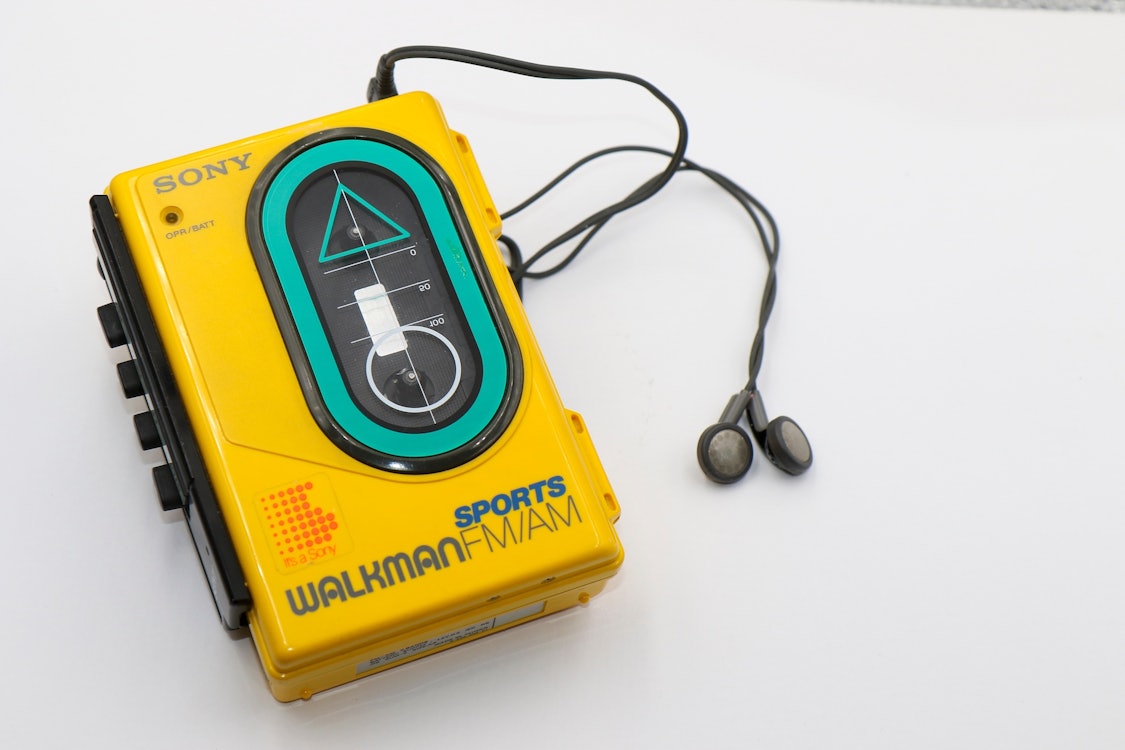
Sony Sports Walkman radio cassette player from the 1980s. Photo by Nicola_K_photos, available via Shutterstock.
Writing under the handle “Bronxiniowa,” Ira Lacher, who actually hails from the Bronx, New York, is a longtime journalism, marketing, and public relations professional.
Just about everything I learned about life I learned from baseball or Star Trek. Baseball is in its off-season, so I offer you this life lesson from the other source.
In the third movie with the show’s original cast, the principal characters time-travel to the late 20th century to bring back to the future a pair of humpback whales whose songs they expect will pacify a space probe destroying the earth. In one scene, Kirk and Spock are riding on a crowded bus across the San Francisco Bay Bridge to observe their anticipated cetacean passengers when a boorish lad turns his boombox, playing a hard-on-the-ears punk-rock number, at maximum volume.
Kirk’s failing diplomacy leaves the sound at jet-engine level, so Spock simply and dispassionately applies to the lout his incapacitating neck pinch, rendering him unconscious so the Vulcan can silence the machine. The passengers give him a standing ovation.
But by the 1980s, boomboxes had given way to the technology that has done more to impair American society than anything up to and including the internet: the Sony Walkman personal cassette player and its clones, the iPod and smartphone.
In a 2019 article in Smithsonian magazine recognizing the 40th anniversary of this nefarious device, Clive Thompson wrote:
Much like the mobile phone, the Walkman tore a rent in the social fabric. To use one was to intentionally seal the public out. “It’s the privatizing of space,” Michael Bull, a University of Sussex professor, who studied Walkman users in the ’90s, told me. “Personal stereos are visual ‘do not disturb’ signs,” he wrote in his book Sounding Out the City.
Some observers recognized this condition far earlier. In a 1981 article—a year after the Walkman had arrived in America from its native Japan—The Washington Post quoted Susan Blond, then a vice president at CBS Records as saying, “With the advent of the Sony Walkman came the end of meeting people. It’s like a drug: You put the Walkman on and you blot out the rest of the world.”
That drug has addicted us as nefariously as Aldous Huxley’s soma, the narcotic in his novel Brave New World, which pacified people into accepting their society’s rigid social preprogramming.
The Walkman didn’t just revolutionize how we listened to music; it altered how we received our information and how we digested it. The device begat the iPod and its podcasts, negating the need to receive news and information in a public manner. Nine in ten of those who use podcasts to get their news trust that what they hear through their buds is accurate—even though podcasts are not regulated by the Federal Communications Commission, as are conventional news broadcasts.
So where once, extremists’ fabulist blatherings would never survive public scrutiny, there no longer is public scrutiny, only the ingestion of pseudopersonal messages aimed at tripping individuals’ triggers. We have seen how effectively a message sent to millions of individuals via podcast or tweet can inspire mass action. Just consider crowdfunding. Or January 6, 2021.
The onset of the COVID-19 pandemic in 2020 drove us further into our individual shells. No longer were we required to interact face to face with others in our workplaces or classrooms. It was no accident that home schooling accelerated from then to now faster than ever before, or that millions of employees still refuse to return to the office. Undercutting every rational reason to do so—inadequate teachers, scanty and expensive day care, long and expensive commutes—is the unspoken belief that we are not a collective society but hundreds of millions of individuals.
Once it was assumed that humans were social animals; that is, needing to interact with one another, share experiences and elevate them to a common level. To some degree this remains so: When tens of thousands gather in football stadiums or attend Taylor Swift concerts, we are exhibiting this DNA-baked-in trait. Inherent characteristics can’t be eliminated overnight.
But the exit signs are apparent. For example, our thrust to inwardness seems to have heightened our impatience and frustration with the common annoyances of life. This was apparent even before the pandemic upped the RPMs. A recent Washington Post article whining about moviegoing as an ordeal of high ticket and concession prices, endless commercials and previews, and too-long features bred hundreds of comments about other inconveniences we once shrugged off. People are acting out violently in response: The Federal Aviation Administration has collected 1,900 reports of unruly airline passengers as of a week before Christmas. And there have been 650 shootings this year, with the year not yet over.
I wish I could be more optimistic about how this eases, but I’m afraid I can’t be. Mr. Spock may have nullified one yahoo with a boombox. But how do you go about yanking pods out of tens of millions of ears?

1 Comment
Having never owned or used a Walkman, iPod or smartphone...
…I don’t remember any direct or indirect societal pressure to use the first two. That was great, because while I enjoy learning many kinds of things, new tech has always been a serious ordeal. But not having a smartphone is becoming more problematic. I know a few other seniors who are smartphoneless, and we agree that the pressure to have one gets stronger every year, as many areas of life ranging from medical care to birdwatching to retail discounts are becoming more and more intertwined with smartphones.
PrairieFan Sat 30 Dec 5:45 PM